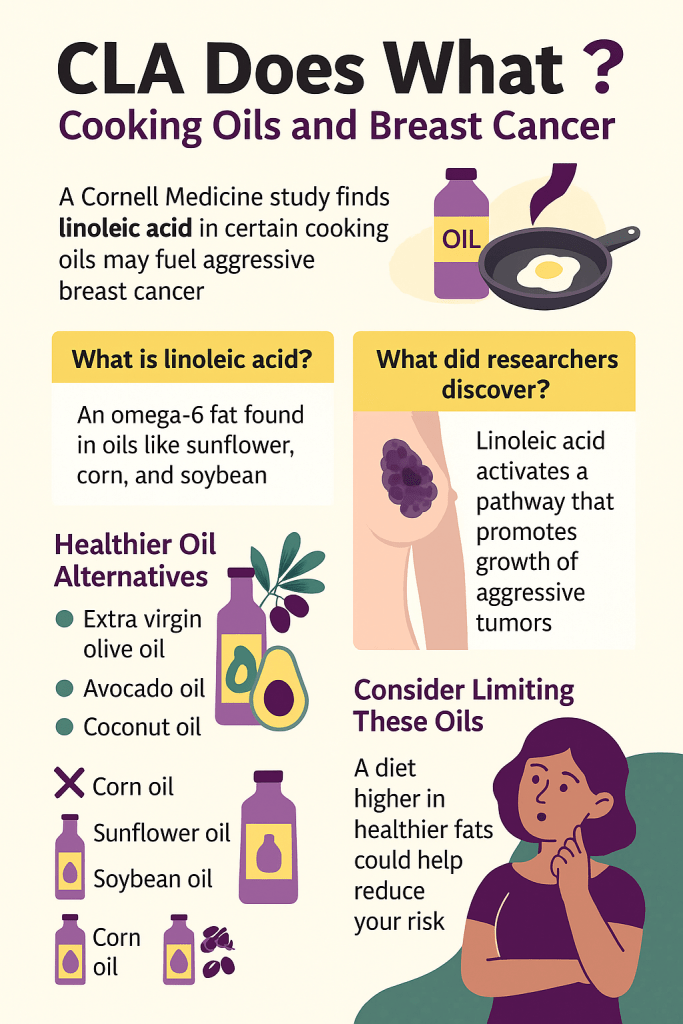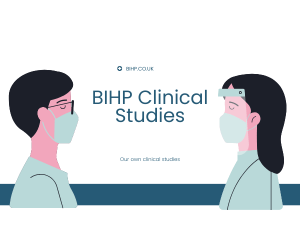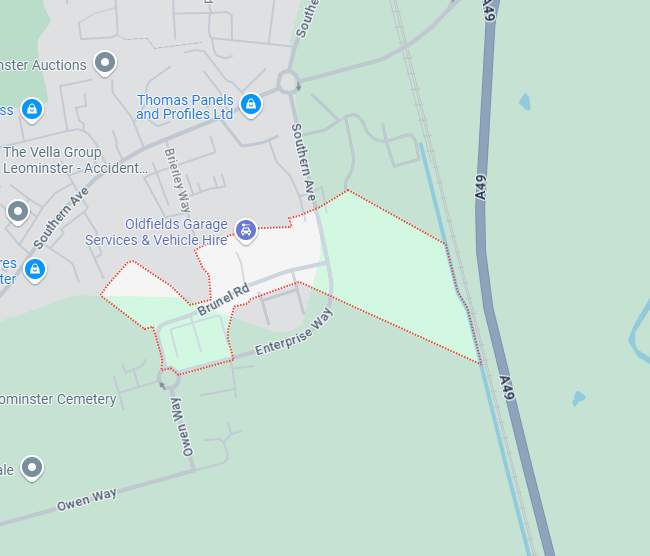Hidden Dangers in Your Cooking Oil
Have you ever stopped to wonder what’s really in your cooking oil? A new study from Cornell Medicine suggests we all should. It turns out that linoleic acid—a type of fat found abundantly in common oils like corn and soybean—might be doing far more harm than good. The big shock? “CLA does what” many had hoped all fats would do—protect the body—whereas linoleic acid might fuel aggressive breast cancers.
Understanding these differences could genuinely change the way you shop, cook, and eat. After all, knowing the risks puts the power back in your hands.
Understanding Linoleic Acid and Why It Matters
Linoleic acid is an omega-6 fatty acid, essential for our bodies in small amounts. It helps maintain healthy skin, regulates metabolism, and plays a role in brain function. Sounds beneficial, right?
However, in modern diets overloaded with processed foods and vegetable oils, linoleic acid intake has skyrocketed. As a result, instead of promoting balance, it may be promoting chronic inflammation—something that can quietly pave the way for conditions like cancer.
So, while linoleic acid is essential, the problem arises when we consume far too much of it.
Meet CLA: A Fatty Acid with a Different Story
Now, you might be wondering, “CLA does what exactly?” Conjugated Linoleic Acid (CLA) is a form of linoleic acid naturally found in grass-fed meats and dairy products. Unlike regular linoleic acid, CLA has been associated with positive health effects such as fat loss, improved immune function, and even potential cancer-fighting properties.
Thus, although they share a similar name, linoleic acid and CLA behave very differently inside our bodies. This small distinction could have a big impact on your health if you pay attention to where your fats are coming from.
Cornell’s New Study: Uncovering Startling Evidence
Researchers at Cornell Medicine delved into how linoleic acid affects breast cancer, particularly the aggressive triple-negative type. Shockingly, they found that linoleic acid binds to a protein called FABP5, which then activates a growth pathway known as mTORC1. This activation allows cancer cells to grow and spread more rapidly.
So, while CLA does what nature intended—support healthy function—excessive linoleic acid appears to flip a biological switch that supercharges cancer growth. Understanding this mechanism makes it clear why dietary choices are far more important than we may have realised.
Triple-Negative Breast Cancer Explained
Triple-negative breast cancer (TNBC) is known for its aggressive behaviour and limited treatment options. Unlike other breast cancers, it doesn’t respond to hormone therapies, making it more challenging to treat effectively.
Given its severity, discovering that common dietary oils could worsen TNBC is deeply concerning. Yet, it also offers hope. If diet influences cancer progression, then making better food choices might offer some defence against this formidable disease.
How Cooking Oils Influence Cancer Growth
Cooking oils rich in linoleic acid don’t just sit harmlessly in our food. Inside our bodies, they interact with proteins and pathways that can lead to dangerous outcomes. In contrast, what CLA does is help reduce the risk by promoting healthier cellular behaviour.
Therefore, the oils you choose daily aren’t just about calories—they’re about whether you’re fuelling your body’s resilience or its vulnerability.
Balancing Good and Bad Fats for Better Health
Fortunately, it’s possible to tip the balance back in your favour. Choosing fats wisely can help reduce chronic inflammation and support overall health. While CLA does what we wish more fats would do—protect and heal—linoleic acid in excess has the opposite effect.
Thus, focusing on a healthier balance between omega-6 and omega-3 fats is one of the best decisions you can make for your wellbeing.
Which Oils to Use and Which to Lose
When choosing oils, it pays to be picky. Here’s a quick guide:
Healthier Oil Alternatives
-
Extra virgin olive oil
-
Avocado oil
-
Coconut oil
-
Butter from grass-fed cows
Common High-Linoleic Oils to Avoid
-
Corn oil
-
Soybean oil
-
Sunflower oil
-
Safflower oil
-
Cottonseed oil
Swapping oils is a simple yet powerful step. After all, every small decision adds up over time.
What Experts Are Saying About Fat Choices
Nutritionists, oncologists, and public health experts alike are starting to emphasise the importance of fat quality, not just fat quantity. They stress that understanding what CLA does—and how linoleic acid behaves differently—is crucial for making healthier dietary choices.
Thus, switching to better fats isn’t just trendy advice; it’s scientifically grounded.
Public Health and Future Dietary Advice
Although current dietary guidelines have not fully caught up with the latest research, changes are on the horizon. Public health campaigns may soon focus more on the dangers of high-linoleic oils and the benefits of natural fats like those containing CLA.
By learning what CLA does and making better choices now, you’re already ahead of the curve.
How Research Is Shaping New Cancer Treatments
Scientists are also exploring how blocking the pathways activated by linoleic acid could lead to new treatments for triple-negative breast cancer. Meanwhile, dietary prevention remains a powerful tool in our hands.
Therefore, paying attention to fat choices isn’t just good advice—it might one day be life-saving.
Real-Life Stories of Change and Hope
Take Jessica, a breast cancer survivor from London. After learning about what CLA does compared to linoleic acid, she revamped her kitchen. She switched oils, added omega-3 foods, and focused on natural, minimally processed meals. Today, she credits these changes with helping her feel stronger and more energised than ever.
Clearly, small changes can lead to big transformations.
Simple Tips to Improve Your Diet
Everyday Choices That Add Up
-
Swap vegetable oils for olive oil or coconut oil.
-
Eat oily fish like salmon or sardines twice a week.
-
Sprinkle flaxseeds or chia seeds on your breakfast.
-
Cook meals from scratch more often.
Shopping Smart and Cooking Wisely
-
Read labels carefully—many “healthy” foods hide vegetable oils.
-
Choose unrefined, cold-pressed oils where possible.
-
Use butter or ghee from grass-fed sources when baking or frying.
Conclusion: Small Changes, Big Differences
Understanding that CLA does what healthier fats are meant to do—support, protect, and nourish—gives you a head start on living better. The choices you make today in the supermarket and in your kitchen can ripple through your health for years to come.
By being mindful about your oils and fats, you can actively stack the odds in your favour for a healthier, stronger future.
FAQs
1. What does “CLA does what” mean in health terms?
It highlights how conjugated linoleic acid benefits health, while excessive linoleic acid from processed oils may increase disease risk.
2. Should I avoid all linoleic acid?
No, but it’s important to moderate intake and balance it with omega-3 fats for a healthier diet.
3. Is CLA better from food or supplements?
Food sources like grass-fed beef and dairy are preferred. Supplements can help, but natural foods provide a wider range of nutrients.
4. Can diet really affect cancer risk?
While not the only factor, diet plays a significant role in inflammation and disease risk, as emerging research shows.
5. How fast will I see benefits after switching oils?
Many people report better energy and digestion within weeks, with long-term benefits appearing over months of consistent choices.
Another interesting clinical study on the use of certain cooking oils, and their possible health effects on us. Hopefully you found the article informative if you would like to have a read through a couple more on related posts we have here on BIHP.co.uk I have put them below. Have a good day.





